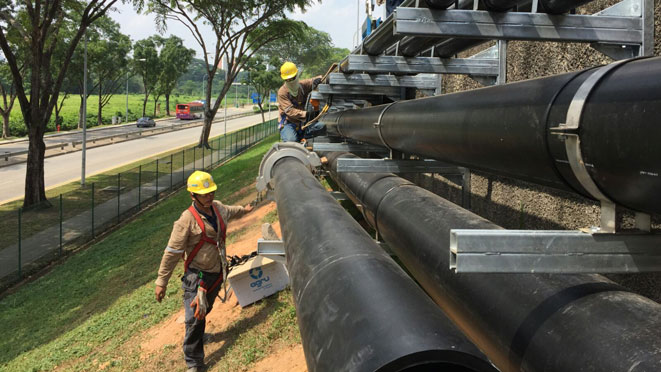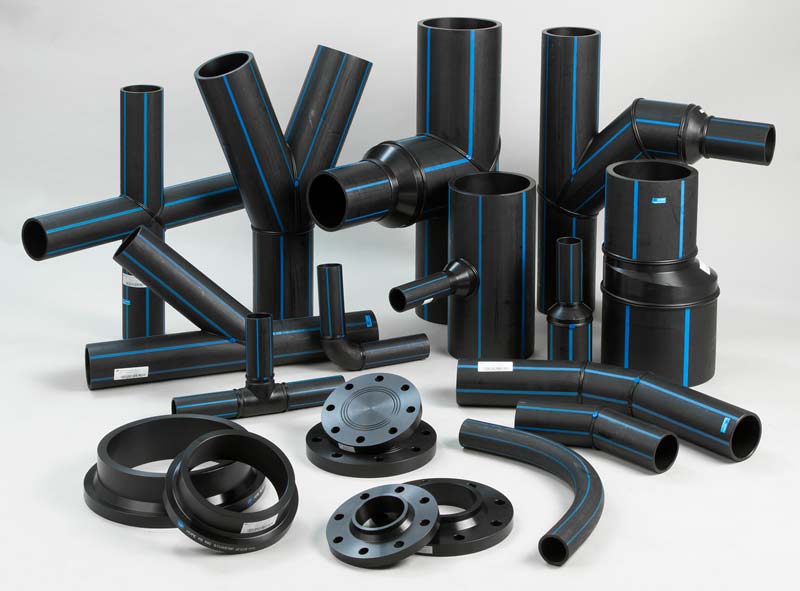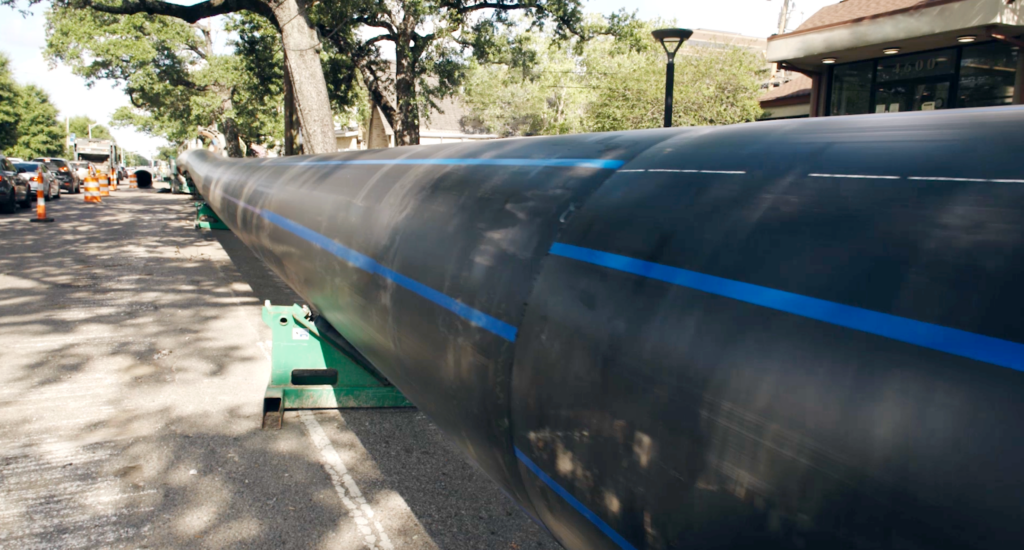How a Pipeline Manufacturer supports long-term infrastructure success
Wiki Article
Discovering the Leading Pipeline Manufacturers: Quality, Dependability, and Innovation
The pipeline manufacturing sector stands at the intersection of development, dependability, and quality, driven by leading firms such as Tenaris and Vallourec. These makers are not only committed to creating high-performance materials but are additionally pioneering lasting techniques that attend to modern ecological concerns (HDPE Pipe Supplier). As we analyze the standards that specify excellence in pipeline solutions, it ends up being noticeable that the landscape is rapidly developing. What details advancements are emerging, and just how are these advancements shaping the future of pipeline framework? The answers might redefine industry criteria in methods that are not yet completely understoodLeading Manufacturers Introduction
In the domain name of pipeline manufacturing, a number of key players become leaders, each contributing considerably to the market's landscape. Firms such as Tenaris, Vallourec, and JFE Steel have established themselves as frontrunners by continually supplying top notch items that satisfy stringent industry standards. Tenaris, renowned for its innovative services, concentrates on seamless and bonded pipelines, catering largely to the oil and gas field. Vallourec, a French multinational, focuses on the production of costs tubular remedies, emphasizing sustainability and advanced innovation in its manufacturing processes.JFE Steel, a significant Japanese manufacturer, is acknowledged for its substantial variety of steel pipelines, specifically those used in energy and facilities tasks. Their dedication to research study and growth has allowed them to generate high-performance materials that withstand harsh ecological problems. Furthermore, firms like U.S. Steel and National Oilwell Varco have actually increased their market presence by diversifying their item offerings and improving operational effectiveness.
These leading manufacturers not only dominate the marketplace but also drive innovation within the market, setting standards for high quality and integrity that gamers desire achieve. Their contributions are vital for fulfilling the increasing demand for effective and sturdy pipeline services worldwide.
Requirements for High Quality Assessment
Quality analysis in pipeline manufacturing depends upon 2 crucial requirements: material durability requirements and making procedure efficiency. Ensuring that materials fulfill extensive resilience criteria is crucial for the longevity and reliability of pipes. Additionally, maximizing the manufacturing process can enhance performance while maintaining premium quality, inevitably influencing overall performance and safety and security.Product Resilience Requirements
Assuring the durability and integrity of pipeline products is important for maintaining framework integrity and operational effectiveness. Product longevity criteria play a vital duty in assessing the top quality of pipelines, dictating the efficiency and life-span of the products used in building and construction. Manufacturers have to abide by a series of rigorous criteria, including those established by companies such as ASTM International and the American Oil Institute (API)These standards evaluate various factors, consisting of corrosion resistance, tensile strength, and exhaustion efficiency. For example, pipelines utilized in destructive atmospheres need products that can hold up against chemical deterioration, while those subjected to high-pressure conditions have to display exceptional tensile toughness.
In addition, aspects such as temperature variations and environmental conditions need to be considered, as these can greatly influence product actions gradually. Manufacturers frequently make use of innovative testing approaches, including increased aging examinations, to simulate lasting wear and assurance that products go beyond or fulfill sector standards.
Manufacturing Process Effectiveness
Manufacturers' capability to maximize making procedure efficiency is crucial for producing high-grade pipelines that meet rigid industry criteria. Efficiency in manufacturing directly affects price management, production timelines, and overall product integrity. To accomplish this, leading pipeline manufacturers implement sophisticated methods such as lean manufacturing, automation, and real-time information analytics.Lean manufacturing principles are important in minimizing waste and taking full advantage of source utilization. By streamlining procedures and removing redundancies, producers can improve efficiency while guaranteeing regular high quality. Automation modern technologies, consisting of robotics and computer mathematical control (CNC) makers, play a critical function in improving accuracy and lowering human error, consequently elevating the reliability of the last product.
In addition, making use of real-time information analytics permits suppliers to check manufacturing procedures continually, allowing them to identify bottlenecks and make timely modifications. This proactive approach not only improves performance but also sustains quality control methods by ensuring compliance with regulatory standards.
Dependability in Pipeline Solutions
Reliability in pipeline services is paramount, as it straight impacts the security and effectiveness of fluid transportation systems. Trick elements include the sturdiness of products used, adherence to strenuous screening and qualification criteria, and the unification of cutting-edge product remedies that improve performance. Understanding these elements is crucial for makers intending to provide reliable pipeline infrastructure.Relevance of Resilience
Achieving longevity in pipeline options is vital, as it straight influences the lasting efficiency and safety of facilities. Resilient pipes are important for minimizing maintenance prices and decreasing the chance of devastating failings. This dependability is particularly vital in markets such as oil and gas, water, and wastewater administration, where the effects of pipeline failing can be severe, both economically and environmentally.The materials and making processes used by pipeline makers play a substantial function in identifying the toughness of the last item. Making use of high-grade basic materials, progressed innovations, and innovative layout principles assures that pipelines can hold up against different stressors, consisting of pressure fluctuations, temperature variants, and harsh environments.
Additionally, the durability of pipelines is carefully linked to their capacity to withstand outside elements such as soil movement, seismic task, and chemical exposures. Reliable deterioration defense methods, such as coverings and cathodic defense, better enhance the longevity of pipes, safeguarding them against deterioration with time.
Purchasing long lasting pipeline options ultimately converts to boosted functional performance, lowered downtime, and improved security, verifying the critical value of longevity in modern pipeline manufacturing.
Examining and Certification Criteria
In the domain of pipeline services, rigorous testing and qualification requirements are crucial to ensure the reliability and safety and security of infrastructure. These requirements function as benchmarks for examining the performance and resilience of pipeline products and systems, validating they meet specific regulative and sector needs.Examining processes typically encompass numerous approaches, consisting of stress screening, hydrostatic analyses, and non-destructive screening strategies. These analyses are crucial for identifying possible weaknesses or problems in the materials prior to right here they are released in real-world applications. Furthermore, qualification by identified organizations guarantees that manufacturers abide by established guidelines, which promotes trust among stakeholders, including service providers, engineers, and end-users.
Numerous prominent pipeline makers take part in continual monitoring and enhancement of their screening protocols to adjust to advancing sector standards and technical developments. Compliance with standards such as ASTM, ASME, and ISO not just enhances product integrity however also decreases the risk of environmental events associated with pipeline failures.
Ingenious Product Solutions
The advancement of cutting-edge product solutions has transformed the landscape of pipeline manufacturing, improving both efficiency and sturdiness. Advanced materials such as high-density polyethylene (HDPE), cross-linked polyethylene (PEX), and composite products have emerged as game-changers, supplying exceptional resistance to corrosion, temperature level changes, and pressure variants. These products not only extend the lifespan of pipes yet likewise decrease maintenance expenses, ensuring trusted long-lasting efficiency.In addition, manufacturers are increasingly taking on clever materials that integrate sensing units for real-time monitoring. This innovation permits proactive maintenance, considerably improving dependability by identifying leaks or structural weaknesses prior to they escalate into crucial failings. The integration of nanotechnology has actually likewise resulted in the development of layers that boost the toughness of pipes versus abrasion and chemical direct exposure.
Sustainability is one more key emphasis, with producers checking out bio-based composites and recyclable materials that decrease environmental effect. As governing criteria remain to evolve, the emphasis on cutting-edge material options ends up being extremely important in meeting stringent safety and security and environmental demands. Inevitably, these developments not just improve the integrity of pipeline systems yet additionally add to the general effectiveness and sustainability of power transport facilities.
Innovations in Pipeline Technology
Advancements in pipeline modern technology are revolutionizing the sector by enhancing performance, safety, and ecological sustainability. Current innovations concentrate on smart pipeline systems that utilize sensors and IoT modern technology to keep track of problems in real time, making it possible for aggressive maintenance and decreasing the threat of failures. These systems can find leaks, stress adjustments, and various other anomalies, enabling quick reaction and decreasing ecological impact.Furthermore, the advancement of innovative products, such as composite and corrosion-resistant alloys, considerably expands the lifespan and reliability of pipes. HDPE Pipe Supplier (American Plastics LLC HDPE Pipeline Manufacturer). These materials reduce maintenance prices and enhance performance in severe atmospheres, making them optimal for oil, gas, and water transport
Automation and robotics are playing an essential role in pipeline building and examination. Drones and robot gadgets facilitate studies and analyses of hard-to-reach locations, making certain thorough evaluations without compromising safety.
Innovative designs, such as modular pipeline systems, allow for higher versatility in setup and adjustment, catering to the vibrant requirements of the energy sector. Together, these technical improvements not only improve operational effectiveness yet likewise add to a more lasting and resistant pipeline framework, leading the way for a greener future.
Case Research Studies of Success
Throughout different markets, successful executions of sophisticated pipeline modern technologies demonstrate significant improvements in operational efficiency and safety and security. One remarkable instance is the deployment of wise pipeline monitoring systems in the oil and gas industry, where real-time information analytics have lowered leakage detection times by over 50%. This not only lessens ecological dangers yet likewise improves the general honesty of pipeline facilities.
Additionally, a major manufacturer applied robot inspection innovations in its pipeline maintenance operations, causing a 40% renovation in assessment efficiency. This approach has streamlined upkeep timetables and considerably minimized downtime.
These study highlight just how top pipeline manufacturers are leveraging advanced technologies to promote reliability and functional quality, eventually setting brand-new standards for the industry. As these successes remain to unfold, they pave the way for further improvements in pipeline manufacturing and management.

Ecological Sustainability Practices
Frequently, pipeline manufacturers are prioritizing environmental sustainability practices to alleviate their environmental footprint and improve the longevity of their items. This commitment is mirrored in different initiatives intended at minimizing waste, preserving power, and using sustainable materials throughout the manufacturing procedure.
Numerous makers are embracing innovative technologies that reduce exhausts and energy usage. The assimilation of automated systems and energy-efficient equipment assists improve production while lowering reliance on fossil gas. Furthermore, business are increasingly transforming to environmentally friendly materials, such as recycled steels and bioplastics, which not only minimize the ecological influence yet likewise advertise a round economy.
Pipeline producers are executing strenuous lifecycle assessments to assess the ecological ramifications of their products from creation to disposal. This strategy enables them to identify chances for enhancement and foster liable sourcing and waste monitoring practices.
Collaboration with environmental companies better enhances these efforts, as manufacturers seek to straighten their procedures with worldwide sustainability objectives. Eventually, these ecological sustainability techniques not only add to a healthier earth however also setting suppliers as responsible leaders in the industry, appealing to environmentally aware stakeholders and clients alike.
Future Fads in Pipeline Manufacturing
As the need for extra efficient and lasting framework expands, pipeline manufacturing is positioned for considerable improvements that will certainly reshape the industry. Key fads prepared for in the coming years consist of the combination of advanced products, such as composite and corrosion-resistant alloys, which enhance longevity while lessening ecological impact. Manufacturers are likewise expected to adopt ingenious manufacturing methods, like additive manufacturing and automation, to enhance processes, minimize waste, and reduced costs.Furthermore, the rise of wise pipeline technologies, incorporating sensors and IoT tools, will make it possible for real-time surveillance and predictive maintenance, thereby boosting safety and security and functional performance. This electronic change will not just optimize source monitoring but likewise promote conformity with rigorous environmental policies.
Sustainability will certainly continue to be a main focus, driving makers to buy environment-friendly techniques, including energy-efficient production approaches and reusing efforts. As the worldwide focus on environment change magnifies, pipeline manufacturers will certainly need to adjust by establishing solutions that satisfy both economic and ecological demands.
Regularly Asked Concerns

What Industries Primarily Make Use Of Pipeline Products From These Manufacturers?
Pipeline products are largely used in markets such as oil and gas, water and wastewater administration, chemical mining, construction, and handling. These sectors count on effective, sturdy, and secure transport of products and fluids.
How Do Manufacturers Guarantee Conformity With International Pipeline Requirements?
Manufacturers ensure compliance with global pipeline requirements by applying rigorous high quality control procedures, performing regular inspections, adhering to established regulative structures, and purchasing employee training to advertise understanding and understanding of safety and high quality requirements.What Is the Typical Life-span of Pipelines From Leading Manufacturers?
The ordinary life expectancy of pipelines from leading makers commonly varies from 30 to 100 years, relying on product, ecological conditions, and maintenance techniques. American Plastics LLC HDPE Pipeline Manufacturer. Routine assessments and adherence to industry standards markedly influence long life and performanceAre There Certifications Details to Pipeline Production Top Quality?
Yes, various qualifications exist for pipeline manufacturing high quality, consisting of ISO 9001 for top quality administration systems and API standards details to pipelines. These qualifications ensure adherence to strenuous safety, performance, and ecological criteria within the market.Just How Do Manufacturers Handle Pipeline Upkeep and Services?
Manufacturers usually implement a positive upkeep approach that includes routine examinations, checking systems for very early detection of concerns, and an organized repair service procedure. This strategy assurances pipeline honesty, minimizes downtime, and enhances overall operational efficiency.Quality analysis in pipeline manufacturing hinges on 2 important requirements: product resilience standards and producing procedure effectiveness - Pipeline Manufacturer. Material toughness criteria play a crucial duty in evaluating the high quality of pipelines, dictating the efficiency and lifespan of the materials used in construction. The materials and manufacturing procedures employed by pipeline suppliers play a substantial duty in determining the toughness of the final item. The typical lifespan of pipes from leading producers usually varies from 30 to 100 years, depending on material, ecological conditions, and upkeep techniques. Yes, numerous qualifications exist for pipeline making top quality, including ISO 9001 for top quality administration systems and API criteria specific to pipelines
Report this wiki page